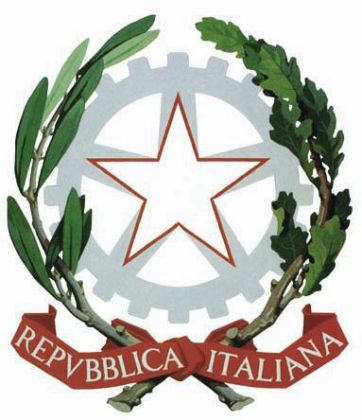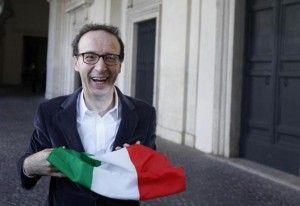Fans of Roberto Benigni should tune in to Rai 1 during prime time on 17 December to hear his reading of the Italian constitution. Best known to English-speaking audiences for his role in La Vita è Bella (Life is beautiful) and to Italians for his rendering of Dante's Divine Comedy and comic impersonations of many politicians, especially ex-prime minister Silvio Berlusconi, Benigni now returns to the state broadcaster, RAI, in the service of the Italian constitution. To make it easier for English-speakers to follow the two-hour event, entitled La più bella del mondo, here are the 12 articles of the Italian constitution in English.
CONSTITUTION OF THE ITALIAN REPUBLIC FUNDAMENTAL PRINCIPLES
Art. 1
Italy is a democratic Republic founded on labour.
Sovereignty belongs to the people and is exercised by the people in the forms and within the limits of the Constitution.
Art. 2
The Republic recognises and guarantees the inviolable rights of the person, both as an individual and in the social groups where human personality is expressed. The Republic expects that the fundamental duties of political, economic and social solidarity be fulfilled.
Art. 3
All citizens have equal social dignity and are equal before the law, without distinction of sex, race, language, religion, political opinion, personal and social conditions. It is the duty of the Republic to remove those obstacles of an economic or social nature which constrain the freedom and equality of citizens, thereby impeding the full development of the human person and the effective participation of all workers in the political, economic and social organisation of the country.
Art. 4
The Republic recognises the right of all citizens to work and promotes those conditions which render this right effective. Every citizen has the duty, according to personal potential and individual choice, to perform an activity or a function that contributes to the material or spiritual progress of society.
Art. 5
The Republic is one and indivisible. It recognises and promotes local autonomies, and implements the fullest measure of administrative decentralisation in those services which depend on the State. The Republic adapts the principles and methods of its legislation to the requirements of autonomy and decentralisation.
Art. 6
The Republic safeguards linguistic minorities by means of appropriate measures.
Art. 7
The State and the Catholic Church are independent and sovereign, each within its own sphere. Their relations are regulated by the Lateran pacts. Amendments to such Pacts which are accepted by both parties shall not require the procedure of constitutional amendments.
Art. 8
All religious denominations are equally free before the law. Denominations other than Catholicism have the right to self-organisation according to their own statutes, provided these do not conflict with Italian law. Their relations with the State are regulated by law, based on agreements with their respective representatives.
Art. 9
The Republic promotes the development of culture and of scientific and technical research. It safeguards natural landscape and the historical and artistic heritage of the Nation.
Art. 10
The Italian legal system conforms to the generally recognised principles of international law. The legal status of foreigners is regulated by law in conformity with international provisions and treaties. A foreigner who, in his home country, is denied the actual exercise of the democratic freedoms guaranteed by the Italian constitution shall be entitled to the right of asylum under the conditions established by law. A foreigner may not be extradited for a political offence.
Art. 11
Italy rejects war as an instrument of aggression against the freedom of other peoples and as a means for the settlement of international disputes. Italy agrees, on conditions of equality with other States, to the limitations of sovereignty that may be necessary to a world order ensuring peace and justice among the Nations. Italy promotes and encourages international organisations furthering such ends.
Art. 12
The flag of the Republic is the Italian tricolour: green, white and red, in three vertical bands of equal size.




























